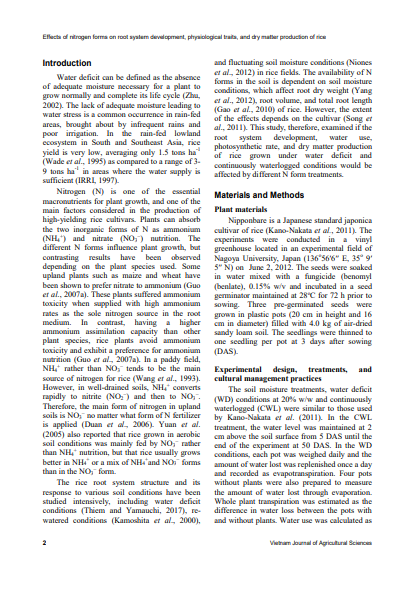The Domestic Solid Waste Management Following Circular Economy Model
1Faculty of Economics and Rural Development, Vietnam National University of Agriculture, Hanoi 131000, Vietnam
2Ministry of Natural Resource and Environment, Hanoi 129100, Vietnam
Main Article Content
Abstract
Along with socio-economic development, the volume of domestic solid waste in Vietnam is increasing by 12% annually. The current management model of domestic solid waste presents many limitations: low collection rate, lack of proper treatment, and low levels of recycling and reusing rates but high rates of buried waste and pollution. Published research and overviews of practical implementation of solid waste management models in typical countries around the world have shown the need to innovate domestic solid waste management in Vietnam following the circular economy model to increase the economic efficiency of resources and to minimize polluting the environment. Accordingly, state management of domestic solid waste needs to be reformed synchronously to ensure the development of a closed cycle of waste from identifying generators, classifying waste at sources, collecting, transporting, and treating waste, to the consumption of recycled waste.
Article Details
References
-
Alan M., Keith S.& Kathryn H. (2016). The Circular Economy: An interdisciplinary exploration of the concept and application in a global context. Retrieved from https://hull-repository.worktribe.com/preview/385013/2016-05-22%2012595%20Haynes.pdf on September 2, 2020.
Luong Thu Thuy (2019). Promoting circular economy models in Vietnam for the sustainable development. Retrieved from https://www.quanlynhanuoc.vn/2020/12/08/thuc-day-nen-kinh-te-tuan-hoan-o-viet-nam-nham-phat-trien-ben-vung-dat-nuoc on May 1, 2020 (in Vietnamese).
World Economic Forum (2014). Towards the Circular economy: Accelerating the scale-up across global supply chains. Geneva, Switzerland.
Government (2015). Decree No. 38/2015/ND-CP on waste and scrap management, dated 24/4/2015. Hanoi (in Vietnamese).
JD (2018). Watch and "go crazy" with the garbage classification regulations of some famous clean countries in the world. Retrieved from https://cafebiz.vn/xem-va-phat-dien-voi-quy-dinh-phan-loai-rac-cua-mot-so-quoc-gia-sach-co-tieng-tren-the-gioi-20181123084113661.chn on May 15, 2020.
Lan Huong (2019). Waste: resources or disaster? Retrieved from http://quochoi.vn/UserControls/Publishing/News/BinhLuan/pFormPrint.aspx?UrlListProcess=/content/tintuc/Lists/News&ItemID=41630 on May 12, 2020.
Macarthur E. (2017). Ellen Macarthur Foundation. Retrieved from https://www.ellenmacarthurfoundation.org/circular-economy/what-is-the-circular-economy on September 2, 2020.
Ministry of Natural Resources and the Environment (2011). 2011 National Environment Report. Hanoi: Natural Resources and Maps Publisher (in Vietnamese).
Ministry of Natual Resources and the Environment (2017). 2017 National Environment Report on Waste management. Hanoi: Vietnam Natural Resources and Maps Publisher (in Vietnamese).
Ministry of Natural Resources and the Environment (2019). Draft of Project to strengthen domestic solid waste management capacity in Vietnam. Hanoi (in Vietnamese).
Ministry of Natural Resources and the Environment (2020). Draft of National Environmental Status Report 2019. Hanoi.
Preston F. (2012). A Global Redesign: Shaping the Circular Economy. London: Chatham House :The Royal Institute of International Affairs.
Nguyen Trung Thang(2019). Overview of solid waste management in the world and some solutions for Vietnam. Journal of Environment. 9. Retrieved from https://thegioimoitruong.vn/tong-quan-ve-quan-ly-chat-thai-ran-tren-the-gioi-va-mot-so-giai-phap-cho-viet-nam.html on May 12, 2020 (in Vietnamese).
Thanh Thao (2018). Vietnam nature and environment protection association. Retrieved from http://www.vacne.org.vn/van-hoa-phan-loai-rac-o-cac-nuoc/217000.html on May 12, 2020 (in Vietnamese).
Vietnam Business Council for Sustainable Development (2019). CEO guide to circular economy VI. Hanoi: Accenture strategy (in Vietnamese).
World Bank (2018). Assessment of domestic and hazardous industrial waste management: options and actions to implement the national strategy. Washington DC: Publishing Department, World Bank.

